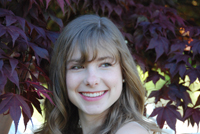Page 102 • (1,087 results in 0.136 seconds)
-

one day I might become a nurse educator. However, prior to further exploring the option of graduate studies I would like to gain experience working in the field. Kelsey Yonce – Bachelor of Arts in psychology, minor in sociology Why PLU? To be completely honest, I chose PLU because of its proximity to my high school boyfriend who was attending UPS. Like most high school relationships, that one didn’t last past graduation, so it’s definitely not a method I recommend for choosing a university! Kelsy
-
stressed evolutionary continuity in the emergence of human intelligence. Increasingly, researchers are focusing on understanding animal minds and thought as distinct from human thought. As Marc D. Hauser, professor of psychology and neuroscience at Harvard, writes in Wild Minds: What Animals Really Think (Henry Holt 2000), “We share the planet with thinking animals . . . . Although the human mind leaves a characteristically different imprint on the planet, we are certainly not alone in this process
-
of self, rather than a dreamed-of salary. In short, discovery of the authentic I inspires professional creativity, and compassionate, reflective citizenship.Creating an environment that promotes lifelong honing of the I is what liberal education is all about. As such, the undergraduate “liberal arts” skills that students learn, be they history, biology, a foreign language, or psychology, should in praxis be a mere framework through which an attentive teacher lays a path for students to discover
-
-capitol-hill/federal-laws-aamp-ld/adaaa-a-section-504/ section-504-in-2009 U.S. Department of Education, Offi ce for Civil Rights, Protecting Students With Disabilities: Frequently Asked Questions About Section 504 and the Education of Children with Disabilities www.ed.gov/about/offi ces/list/ocr/504faq.html The National Center for Learning Disabilities (NCLD) works to ensure that the nation’s 15 million children, adolescents and adults with learning disabilities have every opportunity to succeed in
-
The Sociology curriculum is especially suited to accommodate special interests. Students may pick from among a variety of electives to complete their degree or concentrate their electives in topics of particular interest to them, such as family/gender, crime/deviance or inequality. Students may opt to complete academic internships as part of their elective coursework within the major. Students majoring in social work, business, nursing, education, and psychology find the sociology minor
-
Center for Graduate and Continuing Education in compliance with regional and/or industry accreditation standards, as well as best practices for teaching adult learners. Any questions about these offerings can be directed to Continuing Education at ce@plu.edu or 253-535-7722. Type 1 - add continuing education course offerings (through Center for Continuing Nursing Learning Education) Keeping the kids in the classroom: Irlen Syndrome: What is it? CSPN Neuropsychology and Cancer Related Cognitive
-
) Lifespan Developmental Psychology (4) Pre-Licensure Coursework NURS 305: Patho/Pharm I (4) NURS 306: Foundations of Care Delivery/Health Promotion (3) NURS 307: Health & Physical Assessment (3) NURS 308: Clinical Practicum I (3) NURS 309: Professional Foundations & Principles of Leadership (2) NURS 310: Scholarly Writing Concepts (1) NURS 311: Patho/Pharm II (2) NURS 314: Care of Chronic Conditions (3) NURS 315: Psych/Mental Health (2) NURS 316: Clinical Practicum II (5) NURS 401: Care of Complex
-
an array of initiatives designed to increase enrollments in undergraduate, graduate and continuing education programs ➢ Established Intercollegiate Womens' Lacrosse (expected impact on enrollment +5) ➢ Engaged analysis and established systems for ensuring adequate and appropriate seats for new transfer students. For spring 2024, we were short 49 seats in high demand courses in Biology, Business, Kinesiology, and Psychology. Center for Student Success (CSS) advisors collaborated directly with
-
awarded two degrees within the same discipline. (Example, B.A. and B.S. in Psychology). Second Bachelor’s Degree Earned – Returning Students Students cannot return to have additional majors or minors posted to their records once they graduate unless they complete an entirely new degree. Students who return to PLU to earn a second bachelor’s degree after earning a first bachelor’s degree or those who earned their first degree at another institution must meet the following requirements: Current Catalog
-
within the same discipline. (Example, B.A. and B.S. in Psychology). Second Bachelor’s Degree Earned – Returning Students Students cannot return to have additional majors or minors posted to their records once they graduate unless they complete an entirely new degree. Students who return to PLU to earn a second bachelor’s degree after earning a first bachelor’s degree or those who earned their first degree at another institution must meet the following requirements: Current Catalog: Apply for
Do you have any feedback for us? If so, feel free to use our Feedback Form.


